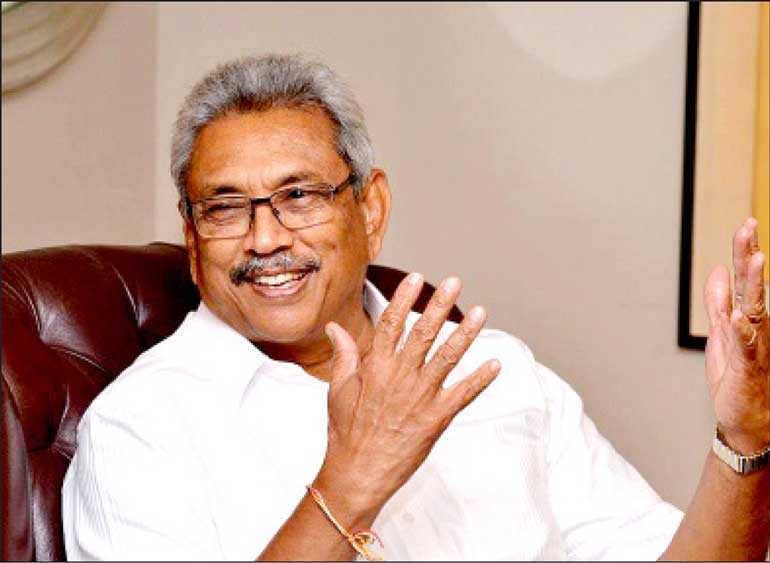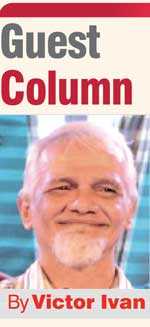Friday Feb 20, 2026
Friday Feb 20, 2026
Friday, 1 May 2020 00:00 - - {{hitsCtrl.values.hits}}

Sri Lanka is now confronted with an extremely complex and decisive crisis unprecedented in the modern history of Sri Lanka. Even before the outbreak of the pandemic, the State, the social order and the economy of Sri Lanka were on the verge of near collapse. The outbreak of the pandemic on top of  that can be said to have worsened the crisis in terms of its magnitude and complexity.
that can be said to have worsened the crisis in terms of its magnitude and complexity.
The current crisis is meant to put all the things that Sri Lanka deems important into a crucial test, particularly the Constitution, the State, the head of State, the ruling party, the Opposition, the institutions of the State and of them mainly the health service, the Election Commission, the Judiciary, bureaucracy in general, media, intellectuals and religious leaders. The individuals and institutions that pass this test will be recognised by the public while the rest are due to end up in the trash of history.
In a sense, the pandemic in itself is posing a test. It poses a threat for everyone that comes its way irrespective of status, race and religion until an effective vaccine is found. It will continue to afflict everyone who lacks efficiency and endurance while taking a toll on the life of some in the process. Similarly, the crisis of Sri Lanka linked with the pandemic and the individuals and institutions mentioned above might be put to a rigorous test.
The image of the President
Among those holding high positions in the country, President Gotabaya Rajapaksa who has become the cynosure, the centre of attraction in the current political scenario of Sri Lanka, will be the one to be put to a most rigorous test, amidst all others, by the crisis. Ultimately this crisis will determine whether the image of the President projected by his advertising machinery is one that is carved out of real gold or fake.
In a political sense, the President can be seen as an extremely fortunate person. At the same time he can be seen equally unfortunate as well. He reached the top of the ‘lissana gaha,’ the greased pole, without much effort and long-term planning. Contrary to popular belief, he can be considered the first to win the Presidential Election solely on the Sinhala Buddhists vote without having to depend on the support of minority communities.
Two factors seem to have contributed to his misfortune. One is that he has inherited only a nominal presidency with no executive powers due to the 19th Amendment introduced to the Constitution, despite being able to win the Presidential Election held by treating the whole country as one single constituency.
The other is the unexpected outbreak of the pandemic before the Parliamentary Election which had already been scheduled for April, 2020, following the victory of the Presidential Election. The second unfortunate factor may be regarded as beyond the control of the President while the first factor  mentioned above is not. It can be considered an instance that reflects the limitations of the foresight of the President.
mentioned above is not. It can be considered an instance that reflects the limitations of the foresight of the President.
Visionary deficiencies
Even though the manner in which the 19th Amendment was enacted is debatable, it can still be considered a lawful constitutional amendment adopted with the unanimous support of not only the governing party but also the political party which the President represents. So much so, it was only one MP who voted against it.
The most significant change effected by the said amendment was to abolish the executive power of the president, thereby reducing his status to that of a nominal president and transfer the Executive power to the Parliament to be exercised by the cabinet of ministers headed by the prime minister. Therefore, Gotabaya Rajapaksa has inherited only a nominal presidency which was devoid of executive powers held by his predecessors commencing from President J.R. Jayewardene and ending with Mahinda Rajapaksa. The power of Gotabaya Rajapaksa is even far less than the power held by President Sirisena, during his tenure the Executive power of the president was rescinded.
A person contesting for a powerful position in the State administration should have a proper understanding of the powers vested in the post. This theory applies to Gotabaya Rajapaksa also. If he had a proper knowledge of the powers attached to the post he was contesting, then he should have known in advance that he would be contesting for a nominal presidency devoid of Executive powers. He should have educated his supporters of the powers of the post he was contesting. He should have refrained from making big promises and made the public aware of the limitations inherent in the executive presidency and that of the fulfilment of expectations of the people as he does not have Executive power.
Either he didn’t have a proper knowledge of the powers attached to the post of president when he was running for the presidency or he was conscious of the limitations but had refrained from making his supporters aware of the true situation.
Any person being elected to a certain post by public vote, no matter how many votes he has got, will not be entitled to more powers than what has been prescribed by law for that position. The entitlement of power remains the same whether one has won an election by a small or a large majority.
The reality of power
It was the post of prime minister, not the presidency which is only a nominal position without executive power, that President Gotabaya Rajapaksa and those who handled his political machinery should have contested and won, if they had wanted power to steer State rule. They ought to have known the changes made in the Constitution by the 19th Amendment. If not known, it has to be reckoned not as a simple matter, but a serious mistake. If a person contesting for a position is inclined to exercise power in excess of what he is entitled to, possibly due to not having proper knowledge of it, he/she should be considered not fit for the post and be removed from it.
It is those who were in charge of the propaganda machinery of the Presidential Election campaign that should be held responsible for this error, more than the President himself. The service it had rendered for many years to ensure the victory of the President was enormous.
The President had strong media machinery capable of making even a black raven a white one. It is still operative. A strong advertising company, with unique techniques and gimmicks, can easily deify an ordinary being in the eyes of the public.
Then the votes are cast for a god, and not for a man, but the danger is, if the so-called god, their hero, fails to deliver their expectations in full measure, he is likely to fall from the divine pedestal into a bottomless pit. In such an eventuality, it is the propaganda machinery that carved him into a super power that shall be blamed rather than the President himself.
The confusion created by the propaganda campaign in the psychological sphere seems to be operating as a factor that disturbs all the activities of the country. According to the Constitution, the President’s role is nominal. However, the dissolution of Parliament has created a situation where the President has assumed the complete control of the administration of the country.
According to the Constitution, the President has only nominal power, but in an atmosphere in which the Parliament is dissolved and there is no foreseeable date for the Parliamentary Election while the President is not in favour of reconvening the old Parliament that stands dissolved at present, it appears that the President has arrogated the Executive powers on himself unlawfully, which are not vested in him by the Constitution.
This situation has contributed to weakening the capacity to contain the crisis. Consequently, it appears to be operating as a factor that aggravates the crisis. What the country needs in a crisis situation like this is not a unitary regime which is contrary to the law and not accountable, but a system of collective democratic governance which is lawful, transparent and responsible for the people. It must be stressed that the modern world has no room for unconstitutional or military rule.